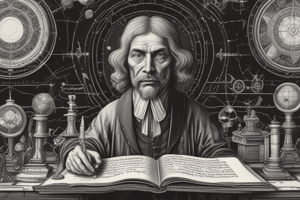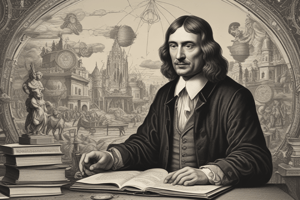Podcast
Questions and Answers
What is the systematic and empirical approach used in the pursuit of scientific knowledge?
What is the systematic and empirical approach used in the pursuit of scientific knowledge?
The scientific method
Which branch of science focuses on the study of matter and energy?
Which branch of science focuses on the study of matter and energy?
Physics
Which branch of science is concerned with the properties, composition, and transformation of matter?
Which branch of science is concerned with the properties, composition, and transformation of matter?
Chemistry
What does the field of geology primarily study?
What does the field of geology primarily study?
What does the field of biology study?
What does the field of biology study?
What does the field of astronomy focus on?
What does the field of astronomy focus on?
Who is credited with the discovery of the Theory of Gravity?
Who is credited with the discovery of the Theory of Gravity?
What did Louis Pasteur and Robert Koch's discoveries lead to?
What did Louis Pasteur and Robert Koch's discoveries lead to?
Which scientist proposed the Theory of Evolution by natural selection?
Which scientist proposed the Theory of Evolution by natural selection?
Who revolutionized our understanding of space, time, and gravity with the Theory of Relativity?
Who revolutionized our understanding of space, time, and gravity with the Theory of Relativity?
What did the Scientific Revolution mark the emergence of?
What did the Scientific Revolution mark the emergence of?
How has science impacted our lives beyond just discovering new knowledge?
How has science impacted our lives beyond just discovering new knowledge?
Flashcards are hidden until you start studying
Study Notes
Exploring the Wonders of Science
Science is a vast and ever-evolving pursuit of knowledge that has shaped our understanding of the universe, ourselves, and our place within it. Let's dive into some key aspects of science and its impact on our world.
The Scientific Method
The pursuit of scientific knowledge relies on the systematic and empirical approach called the scientific method. It consists of asking questions, making observations, forming hypotheses, testing these hypotheses through experiments, and finally drawing conclusions that can be verified and refined. This iterative cycle allows us to build on our existing knowledge and make new discoveries.
The Branches of Science
Science is not a single, monolithic subject; instead, it's divided into various disciplines. Each discipline focuses on a particular aspect or field of study, such as:
- Physics: The study of matter and energy, including the fundamental laws governing these phenomena.
- Chemistry: The study of substances and their interactions, including the properties, composition, and transformation of matter.
- Biology: The study of living organisms, their structures, functions, interactions, and evolution.
- Geology: The study of the Earth, its structure, composition, and processes, both past and present.
- Astronomy: The study of everything beyond Earth's atmosphere, including celestial bodies and phenomena.
- Mathematics: The study of quantity, structure, space, and change, with applications in every scientific discipline.
The Scientific Revolution
The Scientific Revolution, beginning in the 16th and 17th centuries, marked a significant shift in scientific thinking and methodology. This period saw the emergence of the scientific method, the establishment of the first scientific societies, and the birth of the modern scientific community. The works of Galileo Galilei, Johannes Kepler, Sir Isaac Newton, and others laid the foundation for our current understanding of the universe.
Scientific Discoveries and Their Impact
Science has brought about countless discoveries that have transformed our world, including:
- The Theory of Gravity: Sir Newton's theory allowed us to predict and understand planetary motion, the moon's orbit, and the behavior of falling objects.
- Germ Theory: Louis Pasteur and Robert Koch's discoveries led to the development of vaccines, antibiotics, and modern hygiene practices, improving human health worldwide.
- Theory of Evolution: Darwin's theory of evolution by natural selection explained the diversification and adaptation of species over time, providing the foundation for modern biological research.
- Theory of Relativity: Albert Einstein's theory revolutionized our understanding of space, time, and gravity, leading to groundbreaking advancements in physics and technology.
Science is not only about discovering new knowledge but also about its practical applications. It has led to the development of technologies that have changed our lives, such as vaccines, computers, the internet, and space exploration. Through the pursuit of science, we can continue to explore new frontiers and improve our world in ways we never thought possible.
Final Thoughts
Science is a vibrant and dynamic field that has transformed our understanding of the universe, our planet, and ourselves. Its discovery and development have led to countless technological innovations and improvements in human health and wellbeing. As we continue to push the boundaries of science, we can look forward to even more incredible discoveries and innovations that will shape our future. So, let's continue to be curious, ask questions, and explore the wonders of science!
Studying That Suits You
Use AI to generate personalized quizzes and flashcards to suit your learning preferences.




